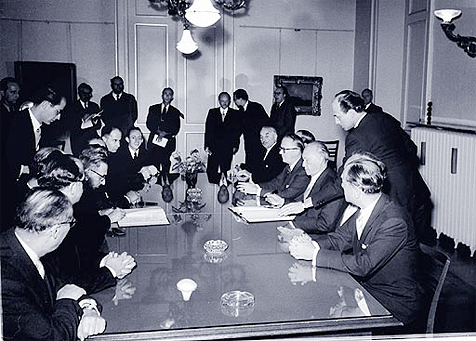
The idea of the Jewish people being compensated for the devastating losses suffered in the Holocaust emerged shortly after the end of World War II. In 1945, Chaim Weizmann, then serving as President of the World Zionist Organization, submitted a memorandum to the victorious powers from the war (United States, USSR, France and Great Britain) asserting that “in view of the mass murder, the human suffering, the annihilation of spiritual, intellectual, and creative forces, which are without parallel in the history of mankind….Restitution of property including buildings, installations, equipment, funds, bonds, stocks and shares, valuables, as well as cultural, literary, and artistic treasures”>
Weizmann’s request was not included as part of the Allied negotiations with Germany. In March 1951, Moshe Sharett, then Israel’s Foreign Minister, submitted a request to the Allies for $1.5 billion dollars to be paid by the West German government. The amount was based on the cost that Israel calculated it would take to absorb 500,000 Holocaust survivors into Israel. At the end of September 1951, after a series of backchannel and secret negotiations, the Chancellor of West Germany, Konrad Adenauer, announced a willingness to negotiate with Israel and representatives of Diaspora Jewry in order to compensate Jewish victims of the Nazis for material damages.
The matter over whether or not Israel should enter into negotiations with West Germany was put to debate in the Knesset. In January 1952, the debate was contentious and gripped the nation. For two days, emotional speeches and even personal verbal attacks were delivered in the Knesset while demonstrators gathered outside Israel’s parliament throwing stones and tangling with police. On January 9, 1952 the Knesset voted 61 to 50 with 5 abstentions (4 members absent) to enter into negotiations with West Germany.
During the ensuing months, more demonstrations against the negotiations occurred across Israel. Menachem Begin, the leader of the opposition Herut Party, who staunchly opposed accepting any German reparations, led many of the mass protest gatherings. Addressing the Knesset during the debate on January 7th, Begin declared, “The fact that Western Germany is a democracy nowadays does not exonerate it from its Nazi past…Half of the employees at Adenauer’s Foreign Office are members of the Nazi Party. And with these people you are going to negotiate – with the murderers who laid down the ground for the annihilation of millions of our brethren while telling the whole world that the persecution of Jews is ‘horrendous propaganda’?” Begin did not to put a price on the death of Jews.
On September 10, 1952, an agreement was signed in Luxembourg by Sharett and Adenauer. The agreement called for West Germany to pay $845 million to Israel in annual installments over 14 years. Coming during the country’s first five years, when Israel experienced economic stress from needs to grow its infrastructure and absorb hundreds of thousands of Jews, mostly from Arab lands, the capital infusion was welcome.
Over the next decade, the reparation funds represented approximately 20% of the country’s development budget. Israel used the term reparations, while West Germany used the term, “Wiedergutmachung, literally translated as to “make whole,” which for many Israelis had the meaning of making things equal. Begin and others did not accept putting a price on the death of hundreds of thousands Jews. Up to 2002, West Germany paid more than 100 billion DM to victims who survived Nazi crimes. The 2002 American Jewish Yearbook has a detailed article about holocaust reparations. http://www.bjpa.org/Publications/details.cfm?PublicationID=14734
